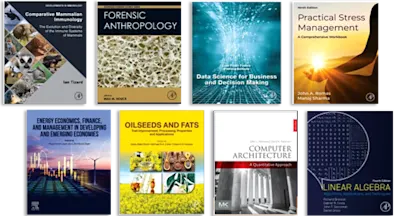
Criminology
Explaining Crime and Its Context
- 7th Edition - June 25, 2010
- Imprint: Anderson
- Authors: Stephen E. Brown, Finn-Aage Esbensen
- Language: English
- eBook ISBN:9 7 8 - 1 - 4 3 7 7 - 7 8 9 5 - 3
Criminology: Explaining Crime and Its Context, Seventh Edition, provides an introduction to crime and its underlying theories. It also seeks to present evidence and stimulate… Read more
Purchase options

Criminology: Explaining Crime and Its Context, Seventh Edition, provides an introduction to crime and its underlying theories. It also seeks to present evidence and stimulate critical thought on a range of criminological perspectives. The book is divided into three parts. Part I discusses the foundations for the study of criminology, exploring crime, its context, and its causes. It highlights three important issues: the relativity of crime, the prevalence of the scientific method in the field of criminology, and the influence of ideology on explanations of crime and on crime policy. Part II deals with criminological theory, covering deterrence and rational choice theories, biogenic and psychogenic theories, social structure theories, social process theories, social reaction theories, and developments in criminological theory. Part III explains the different forms of criminal activity, focusing on three types of crime: violent, economic, and victimless. Violent and economic crimes include “street crimes,” such as robbery, burglary, and rape, and widespread and harmful “white collar” crime. Offenses that can be classified as “victimless” are those where the parties engage in the criminal behavior voluntarily, such as prostitution and drug use.
- Comprehensive introductory text, emphasizing the ideology of crime.
- Boxes throughout each chapter highlight the text with figures, features and highlights.
- Each chapter concludes with key terms and concepts, key criminologists, key cases.
Students in the criminal justice field.
Dedication
Preface
Part I Foundations for Criminology
1 Crime and Criminology
Criminology as Science
Ideology within Criminology
The “Crime” in Criminology
Paradigms in Criminology
Policy and Criminology
Summary
2 Criminal Law and the Criminal Justice System
The Concept of Law
The Criminal Justice System
Goals of Criminal Justice
Administration of Justice
Summary
3 Production of Crime Statistics
Review of Elementary Research Methodology
History of Official Crime Statistics
Description of the Uniform Crime Reports
A New Look to the UCR: NIBRS–National Incident-Based Reporting System
Alternative Measures of Crime
Comparison of UCR, SRD, and NCVS Data Sources
Summary
4 Distribution of Crime
Volume of Crime: Uniform Crime Reports
Volume of Crime: National Crime Victimization Survey
Volume of Crime: Self-Report Studies
Distribution of Crime by Gender
Distribution of Crime by Age
Distribution of Crime by Race
Distribution of Crime by Social Class
Victims of Crime
Summary
Part II Theories of Crime
5 Deterrence and Rational Choice Theories of Crime
Preclassical Views of Crime
The Classical School of Criminology
Contemporary Deterrence Theory
Conceptualizing Deterrence
A Rational Choice Perspective
How Rational Is Choice?
Summary
6 Biogenic and Psychogenic Theories of Crime
Criminal Heredity: The Bad Seed Theory
Contemporary Biological Perspectives
Psychogenic Theories of Crime
Psychoanalytic Theories
Personality Theories
Integrating Psychological Explanations
Summary
7 Social Structure Theories of Crime
Strain Theories
Assessing Strain Theories
Policy Implications
Social Ecology
Summary
8 Social Process Theories of Crime
Learning Criminal Behavior
Culture Conflict and Crime
Social Control and Crime
Summary
9 Social Reaction Theories of Crime
Labeling Theory
Roots of Critical Criminology
Summary
10 Recent Developments in Criminological Theory
Integrated Theoretical Models
The Criminal Career Debate
Developmental and Lifecourse Criminology
Policy Implications of Developmental Criminology
Summary
Part 3 Types of Crime
11 Violent Crime
Index Crimes: Murder, Assault, and Rape
Family Violence
Corporate, Government, and Professional Violence
Summary
12 Economic Crime
Acquisitiveness and Theft
Acquisitiveness Cross-Culturally
Social Conditions and Theft
The Law of Theft
Background of White-Collar Crime
Forms of White-Collar Crime
Rationalization and White-Collar Crime
Other Characteristics of White-Collar Crime
Crooked Corporations and Thieving Executives
Criminological Theory and White-Collar Crime
Summary
13 Crimes without Victims and Victims without Crimes
Crimes without Victims
Should They Be Crimes?
Pornography
Motorcycle Helmets
Pros and Cons
The Decriminalization Drift
Physician-Assisted Suicide
Prostitution—Sex Work
Drug Offenses
Trends in Drug Use
Victims without Crimes
Cigarette Smoking
Summary
Appendix to Chapter 4
Name Index
Subject Index
About the Authors
- Edition: 7
- Published: June 25, 2010
- Imprint: Anderson
- Language: English
SB
Stephen E. Brown
Stephen E. Brown is a Professor of Criminology & Criminal Justice and Department Head at Western Carolina University. He received the Ph.D. in Criminal Justice and Criminology from The University of Maryland in 1979. He went through the professorial ranks at East Tennessee State University, serving as Department Chair for 11 years and leaving as Professor Emeritus in 2008. Brown has published articles in a number of journals, including Criminology, Journal of Criminal Justice, Journal of Criminal Justice Education, Criminal Justice Review, Youth and Society and Social Science Quarterly. His areas of research interest have been broad, covering topics such as family violence, deterrence, delinquency, and application of statistics within criminology. He has served as a Trustee on the board of The Academy of Criminal Justice Sciences, and as editor of The American Society of Criminology’s The Criminologist. He is currently working with several colleagues in assessing pedagogical challenges in teaching social science statistics.
Affiliations and expertise
Western Carolina UniversityFE
Finn-Aage Esbensen
Finn-Aage Esbensen is the E. Desmond Lee Professor of Youth Crime and Violence in the Department of Criminology and Criminal Justice at the University of Missouri-St. Louis and is currently serving as Department Chair. He has held research positions at the Center for Criminal Justice at Harvard Law School; Catholic University; the Behavioral Research Institute, Boulder, Colorado; and the Institute of Behavioral Science, University of Colorado. He received both his B.A. (German and Sociology) and M.A. (Sociology) degrees from Tufts University and his Ph.D. (Sociology) from the University of Colorado, Boulder.
Affiliations and expertise
University of Missouri-St. LouisRead Criminology on ScienceDirect